The Department of Anthropology in Yangon University was established in 1950, in Judson Hall. Its location on the campus has moved over the years: first, to the Social Science building, then in 1964 to Taungoo Hall. Since 1983 the Anthropology Department has been located in Yamanya Hall. The Department started small, with few staff and students but then expanded to include Sociology and even International Relations for a few years until Anthropology was reduced to a minor subject status under the new education system in 1964. At that point, the Department shrank in numbers of staff and students, until 1982 when Anthropology was restored to major subject status again.
In the early years of the Department, several overseas academics supported the teaching of Anthropology, Sociology and International Relations in Yangon, while several Myanmar academics furthered their studies in the USA and the UK. Nowadays the Department is staffed by Myanmar academics.
Anthropology can be taken by Arts students as well as Science students. Science students taking Anthropology as a minor subject can earn a B.A Degree. Post-graduate students have to carry out field research and collect survey data for their Masters thesis.
Following the example of the University of Yangon, in the late 1950s other intermediate colleges teaching Anthropology were opened in Myanmar: in Mawlamyine, Pathein and Kyaukphyu.
Detailed History: The Department of Anthropology in Yangon University was established in 1950 under the Rector at that time, Dr. Htin Aung, in Judson Hall. Dr Htin Aung was also an honorary professor of the Anthropology Department, lecturing with visiting professor Dr. K. G. Orr from Chicago University.
To begin with the Anthropology Department had seven first year students and three post graduate students. Daw Khin Khin Oo and Daw Khin Hmway were appointed tutors before Dr. K. G. Orr left to go back to Chicago. Then the two tutors were sent on state scholarships to Chicago and Alabama Universities in the USA and Mr. Musgrave lectured during their absence.
When Daw Khin Khin Oo and Daw Khin Hmway returned from the USA in the a/y 1952-1953, Daw Khin Khin Oo was appointed Head of the Anthropology Department and the Department started teaching a range of classes from intermediate level, with a Masters degree introduced in 1957.
Several overseas academics taught in the Anthropology Department over the years in addition to those already mentioned. Mr. A. Sharma from New Delhi University was a full time assistant lecturer 1953 to 1955, and Dr. Orshinski, a Fullbright Smithsonian scholar, lectured in 1954-1955. Dr. Burling (1959-1960), Dr. E. B. Banks (1960-1961) and Mr. B. A. V. Peacock (1960-1962) also worked as Anthropology lecturers.
Several of the Myanmar academic staff studied for their postgraduate degrees in the United Kingdom and the United States of America on state scholarships.
From 1954 until 1959 the Department taught Sociology as well and became the Department of Sociology and Anthropology. Mr. K. W. Dunning (1957-1958), Dr. F. Nothingham (1957-1958), Dr. G. Theodorson (1958-1959) and Mr. P. A. Mannis (1958-1959), all Fullbright Smithsonian scholars, taught Social Science subjects. When faculties were introduced in the University of Yangon, Anthropology and Sociology became part of Social Sciences.
From 1957 to 1959, Dr. Johnstone from John Hopkins Centre taught International Relations through the Anthropology Department, at Bachelor of Arts and Masters levels. In 1959-60, International Relations moved into the Department of History.
In 1959 Sociology teaching was discontinued until the new education system started in 1964.
In 1962, staff postings within the university left only a lecturer and an assistant lecturer in the Department of Anthropology. There were only 33 students taking Anthropology in 1964, with only three studying for an Anthropology Masters degree.
Under the new education system in 1964, Anthropology became just a minor subject. Only in 1982 was it restored to major subject status again.
In the newly established Anthropology Department, from 1982, Daw Nwe Nwe took over as the Head of Department. There were only twenty students in the first year class, and the same in 1983. Six teaching members of staff taught them, including the Head of Department: Daw Nwe Nwe, Daw Kyin Kyin, U Wallace Kangyi, Daw Aye Aye Myint, U Sein Htun and Daw Tin Yi.
After Daw Nwe Nwe had retired, Daw Kyin Kyin succeeded her as Head of Department, followed in her turn by U Sein Htun, then Daw Tin Yi from 1990 to 1997 when she became a professor. After Daw Tin Yi retired in 2005, U Kyaw Han succeeded her, followed by Dr. Daw Mya Mya Khin. Dr Daw Mya Mya Khin has been Head of the Anthropology Dept from 2006 up until the present.
Meanwhile, in the Hlaing Campus of the University of Yangon, the first Anthropology classes started in 1982. U Wallace Kangyi was the Branch Head at that time. From 1991 to 1995 U Kyaw Han served as Branch Head.
Now the number of Anthropology students increases annually and ranges from first year undergraduate students to Masters Research students specializing in Anthropology. PhD courses have been running since a/y 2006-2007.
Dr Khin Muyar Aung Professor
Dr San San Oo Professor
Daw Khin Moe Moe Kyu Associate Professor
Dr Zin Zin Htet Aung Lecturer
Daw Moe Thandar Soe Tutor
U Soe Win Than Tutor
The Department of Anthropology has contacts with the following universities and Institutes:
ဒေါက်တာ မြမြခင်
ဒေါက်တာ သန်းပုလဲ
First Year (Anthropology) Semester I

Foundation Courses
မ ၁၀၀၁ (3) မြန်မာစာ
Eng -1001 (3) English
Core Courses
Anth- 1101 (4) General Anthropology (I)
Anth- 1102 (4) Cultural Anthropology (I)
*Elective Courses (For Anthropology Specialization)
Hist-1001 (3) Introduction to Myanmar Civilization (I)
Phil-1001 (3) Logic in Practice
Geog-1003 (3) Geography of South East Asian Countries
Psy- 1001 (3) Child Development
Psy- 1002 (3) States of Consciousness
Psy- 1003 (3) General Psychology I
Psy-1004 (3) Public Relation
IR. 1001 (3) Introduction to International Relations I
Os -1001 (3) Fundamentals of Pāli Language
AM -1001 (3) Aspect of Myanmar (I)
*Elective Courses (For Other Specialization)
Anth- 1001 (3) Introduction to General Anthropology (I)
Anth- 1002 (3) Introduction to Cultural Anthropology (I)
First Year (Anthropology) Semester II

Foundation Courses
မ ၁၀၀၂ (3) ျမန္မာစာ
Eng – 1002 (3) English
Core Courses
Anth- 1103 (4) General Anthropology (II)
Anth- 1104 (4) Cultural Anthropology (II)
*Elective Courses (For Anthropology Specialization)
Hist-1004 (3) Introduction to Myanmar Civilization II
Geog-1004 (3) Geography of Myanmar
Psy- 1005 (3) Psychology of Adolescence
Psy- 1006 (3) Psychological Disorders
Psy- 1007 (3) General Psychology II
Psy -1008 (3) Understanding Human Interaction
IR.1004 (3) Introduction to International Relations II
Os -1002 (3) Fundamentals of Pāli Language
Li- 1002 (3) Library Information Sources
AM -1002 (3) Aspect of Myanmar (II)
*Elective Courses (For Other Specialization)
Anth- 1003 (3) Introduction to General Anthropology (II)
Anth- 1004 (3) Introduction to Cultural Anthropology (II)
Second Year (Anthropology) Semester I
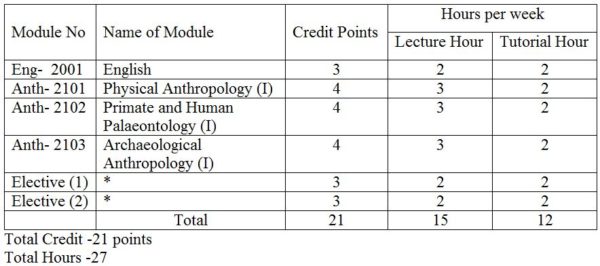
Foundation Course
Eng- 2001 (3)English
Core Courses
Anth- 2101 (4) Physical Anthropology (I)
Anth- 2102 (4) Primate and Human Palaeontology (I)
Anth- 2103 (4) Archaeological Anthropology (I)
*Elective Courses (For Anthropology Specialization)
Hist-2001 (3) History of Science and Technology
Eng-2003 (3) Developing Communicative Skill
Geog-2009 (3) Human Geography (I)
Psy -2001 (3) Language and Thought
Phil-2002 (3) Philosophy of Environmental Conservation and Sustainable Development
IR- 2001 (3) Elements of Political Organization
Os -2001 (3) Pāli Language
Myan-2005 (3) ျမန္မာအမ်ိဳးသမီးစာဆိုေတာ္မ်ားႏွင့္ ၄င္းတို႔၏ စာမ်ား
Anth- 2009 (3) Applied Anthropology (I)
*Elective Courses (For Other Specialization)
Anth- 2001 (3) Physical Anthropology (I)
Anth- 2002 (3) Socio-cultural Anthropology (I)
Anth- 2003 (3) Myanmar Culture (I)
Anth- 2004 (3) Ethnography of Myanmar (I)
Second Year (Anthropology) Semester II
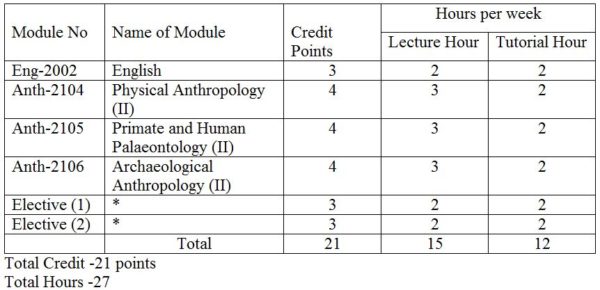
Foundation Course
Eng- 2002 (3)English
Core Courses
Anth- 2104 (4) Physical Anthropology (II)
Anth- 2105 (4) Primate and Human Palaeontology (II)
Anth- 2106 (4) Archaeological Anthropology (II)
*Elective Courses (For Anthropology Specialization)
Hist- 2003 (3) History of Science and Technology
Eng- 2004 (3) Developing Communicative Skill
Geog-2010 (3) Human Geography (II)
Psy – 2005 (3) Introduction to Social Problem
Phil- 2007 (3) Philosophy of Environmental Conservation and Sustainable Development
Os- 2006 (3) Pāli Language
IR- 2004 (3) Elements of Political Organization
Myan-2008 (3) ျမန္မာအမ်ိဳးသမီးစာဆိုေတာ္မ်ားႏွင့္ ၄င္းတို႔၏ စာမ်ား
Anth- 2010 (3) Applied Anthropology (II)
*Elective Courses (For Other Specialization)
Anth- 2005 (3) Physical Anthropology (II)
Anth- 2006 (3) Socio-cultural Anthropology (II)
Anth- 2007 (3) Myanmar Culture (II)
Anth-2008 (3) Ethnography of Myanmar (II)
Third Year (Anthropology) Semester I

Foundation Course
Eng- 3001 (3)English
Core Courses
Anth- 3101 (4) Social Organization (I)
Anth- 3102 (4) Religious Beliefs (I)
Anth- 3103 (4) Culture & Personality (I)
Anth- 3104 (4) The Study of Human Variation (I)
*Elective Courses (For Anthropology Specialization)
Geol-3001 (3) Palaeontology (I)
Anth-3001 (3) Anthropology and the future (1)
*Elective Courses (For Other Specialization)
Anth- 3003 (3) Religious Beliefs (I)
Third Year (Anthropology) Semester II
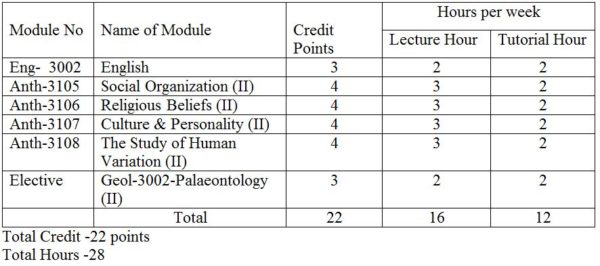
Foundation Course
Eng -3002 (3) English
Core Courses
Anth- 3105 (4) Social Organization (II)
Anth- 3106 (4) Religious Beliefs (II)
Anth- 3107 (4) Culture & Personality (II)
Anth- 3108 (4) The Study of Human Variation (II)
*Elective Courses (For Anthropology Specialization)
Geol-3002 (3) Palaeontology (II)
Anth-3002 (3) Anthropology and the future (1I)
*Elective Courses (For Other Specialization)
Anth- 3004 (3) Religious Beliefs (II)
Fourth Year (Anthropology) Semester I
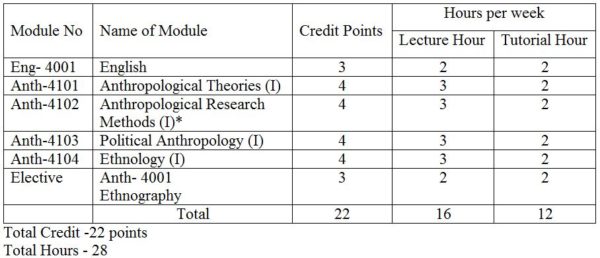
Foundation Course
Eng- 4001 (3) English
Core Courses
Anth- 4101 (4) Anthropological Theories (I)
Anth- 4102 (4) Anthropological Research Methods (I)
Anth- 4103 (4) Political Anthropology (I)
Anth- 4104 (4) Ethnology (I)
*Elective Courses (For Anthropology Specialization)
Anth- 4001 (3) Ethnography
Fourth Year (Anthropology) Semester II
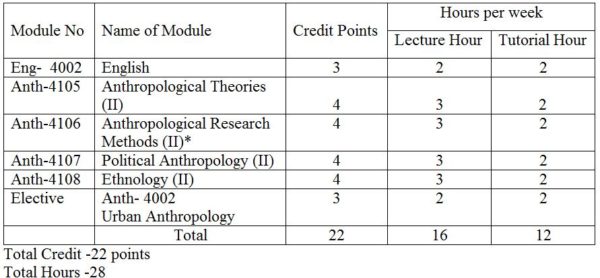
Foundation Course
Eng- 4002 (3) English
Core Courses
Anth- 4105 (4) Anthropological Theories (II)
Anth- 4106 (4) Anthropological Research Methods (II)
Anth- 4107 (4) Political Anthropology (II)
Anth- 4108 (4) Ethnology (II)
*Elective Course (For Anthropology Specialization)
Anth- 4002 (3) Urban Anthropology
မွတ္ခ်က္။ ။ (၁) Anth- 4102 & Anth- 4106, Anthropological Research Methods
ဘာသာရပ္တြင္ ကြင္းဆင္းသုေတသနျပဳလုပ္ပံု၊ ျပဳလုပ္နည္းကို လက္ေတြ႔သင္ၾကားရန္အတြက္ သုေတသနခရီး ထြက္းပါမည္။
(၂) ပထမပညာသင္ႏွစ္ဝက္စာေမးပြဲေျဖဆိုျပီးပါက (၅) ရက္မွ (၁၀)ရက္အထိ ကြင္းဆင္းသုေတသန ခရီးထြက္ပါမည္။
(၃) ၎ဘာသာရပ္အတြက္ Tutorial (၁၀)မွတ္ ၊ လက္ေတြ႔ကြင္းဆင္းမႈကို (၁၀)မွတ္ သတ္မွတ္ပါမည္။
First Year Honours (Anthropology) Semester 1

Foundation Courses
Eng-3001 (3) English
Core Courses
Anth- 3201 (4) Social Organization (I)
Anth- 3202 (4) Religious Beliefs (I)
Anth- 3203 (4) Culture & Personality (I)
Anth- 3204 (4) The Study of Human Variation (I)
*Elective Courses (For Anthropology Specialization)
Geol-3001 (3) Palaeontology (I)
Anth-3001 (3) Anthropology and the future (I)
*Elective Courses (For Other Specialization)
Anth- 3001 (3) Religious Beliefs (I)
First Year Honours (Anthropology) Semester II
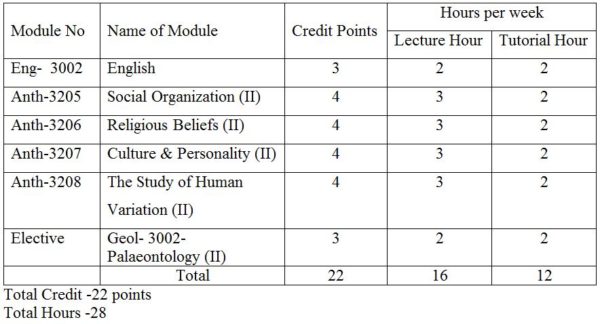
Foundation Courses
Eng- 3002 (3)English
Core Courses
Anth- 3205 (4) Social Organization (II)
Anth- 3206 (4) Religious Beliefs (II)
Anth- 3207 (4) Culture & Personality (II)
Anth- 3208 (4) The Study of Human Variation (II)
*Elective Courses (For Anthropology Specialization)
Geol – 3002 (3) Palaeontology (II)
Anth- 3002 (3) Anthropology and The future (II)
*Elective Courses (For Other Specialization)
Anth- 3002 (3) Religious Beliefs (II)
Second Year Honours (Anthropology) Semester I
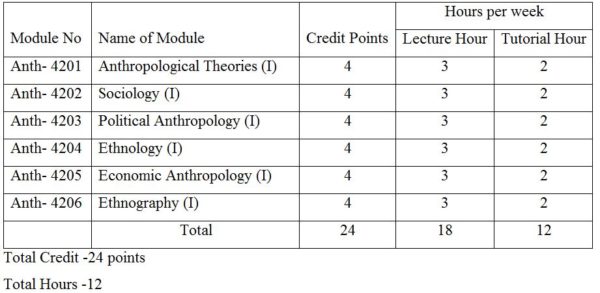
Core Courses
Anth- 4201 (4) Anthropological Theories (I)
Anth- 4202 (4) Sociology (I)
Anth- 4203 (4) Political Anthropology (I)
Anth- 4204 (4) Ethnology (I)
Anth- 4205 (4) Economic Anthropology (I)
Anth- 4206 (4) Ethnography (I)
Second Year Honours (Anthropology) Semester II
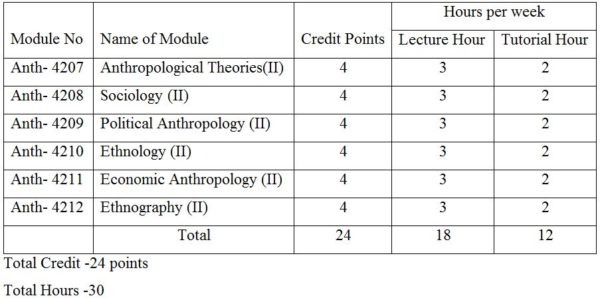
Core Courses
Anth- 4207 (4) Anthropological Theories (II)
Anth- 4208 (4) Sociology (II)
Anth- 4209 (4) Political Anthropology (II)
Anth- 4210 (4) Ethnology (II)
Anth- 4211 (4) Economic Anthropology (II)
Anth- 4012 (4) Ethnography (II)
Third Year Honours (Anthropology) and Qualify Semester I
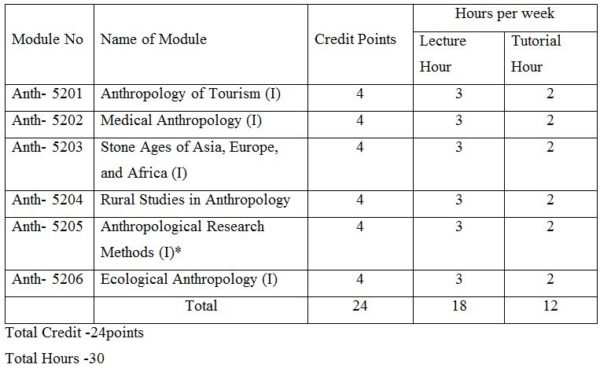
Core Courses
Anth- 5201 (4) Anthropology of Tourism (I)
Anth- 5202 (4) Medical Anthropology (I)
Anth- 5203 (4) Stone Ages of Asia, Europe, and Africa (I)
Anth- 5204 (4) Rural Studies in Anthropology
Anth- 5205 (4) Anthropological Research Methods (I)*
Anth- 5206 (4) Ecological Anthropology (I)
မွတ္ခ်က္။ ။ (၁) Anth- 5205 & Anth- 5211, Anthropological Research Methods
ဘာသာရပ္တြင္ ကြင္းဆင္းသုေတသနျပဳလုပ္ပံု၊ ျပဳလုပ္နည္းကို လက္ေတြ႔သင္ၾကားရန္အတြက္ သုေတသနခရီး ထြက္းပါမည္။
(၂) ပထမပညာသင္ႏွစ္ဝက္စာေမးပြဲေျဖဆိုျပီးပါက (၅) ရက္မွ (၁၀)ရက္အထိ ကြင္းဆင္းသုေတသန ခရီးထြက္ပါမည္။
(၃) ၎ဘာသာရပ္အတြက္ Tutorial (၁၀)မွတ္ ၊ လက္ေတြ႔ကြင္းဆင္းမႈကို (၁၀)မွတ္ သတ္မွတ္ပါမည္။
Third Year Honours (Anthropology) and Qualify Semester II
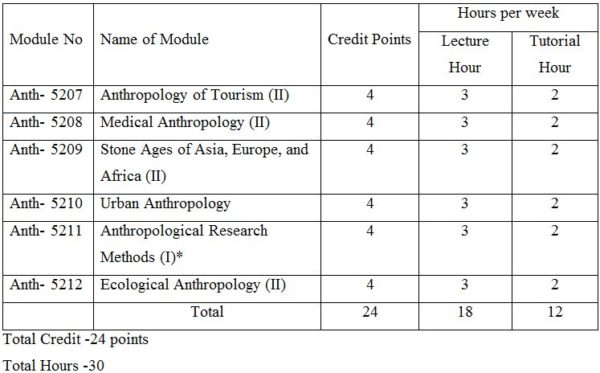
Core Courses
Anth- 5207 (4) Anthropology of Tourism (II)
Anth- 5208 (4) Medical Anthropology (II)
Anth- 5209 (4) Stone Ages of Asia, Europe, and Africa (II)
Anth- 5210 (4) Urban Anthropology (II)
Anth- 5211 (4) Anthropological Research Methods (II)*
Anth- 5212 (4) Ecological Anthropology (II)
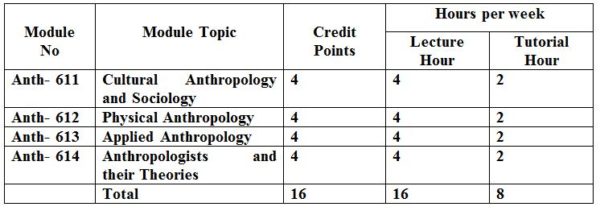
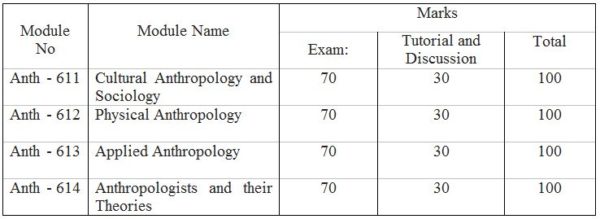

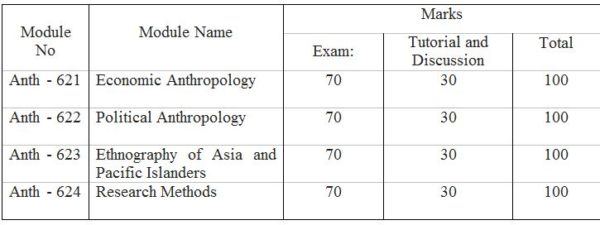







GRADUATE COURSES FOR Ph. D. IN ANTHROPOLOGY
Total Credits = 16 per week
Total Hours = 28 per week
Anth 711 Physical Anthropology
Part- 1
-Chemical compositions of man
-Organelles of cell-structure and functions
– Teminology
– General structure of Nucleic acids
– Deoxyribonucleic acid (DNA)
– Ribonucleic acid ( RNA)
– different types of RNA and their significances
– Amino acids
– Protein synthesis
– Chromosoneal disorders
– Some common diseases
Part- 2
– Origin of earth
(a) The solar system- the sun and nine planets
(b) Theories of formation of the earth
– Vertebrate animal kingdom
(a) Fishes, Amphibians, Reptiles, Mammals, Apes
(a) Concept of Evolution
(b) Approach to Evolution
(c) Early theories in Evolution
(d) Darwin theory of Evolution
– Primate: Fayum Primates, Pondaung Primates, Krabi Primates
– Evolution of man: Auatralopithecus, Homohabilis, Homoerectus, Homo Sapien
Neanderthalensis, Homo Sapien Sapien
(a) Basic anatomy of Man
(b) The genetic mechanisms of evolution
(c) DNA, RNA
(d) Race as an evolution process
Anth 712 Cultural Anthropology
(a) Language and communication
(b) Language in its cultural setting
(c) Language and thought
(d) Theoretical Linguistics
(e) American Linguistics
(a) Capitalist development and cultural experience
(b) Colonialism and Malay peasants
(c) Post colonialism and Philippine
(d) Socio-culturalism and India
(a) Founders
(b) The nature of culture and society
(c) Evolutionary, adaptationalism and materialism
(d) Structures, symbols, and meaning, practice, agency and power
(a) Archaeology in Anthropology
(b) Paleolithic culture, Mesolithic culture, Neolithic Culture, Metal, Metal Age
(c) Prehistoric economy and Social Organization
Anth 713 Ethnographic Methods
An Overview of Ethnography
Ethnographic Perspectives
Writing Ethnography
Anth 714 Applied Anthropology
Medical Anthropology
Introduction to Medical Anthropology
The Anthropological Approach in Health and Health Care
Qualitative Studies Including Anthropological Research in Health
Tourism Anthropology
An Anthropological Perspective on Tourism and Commodification
Authenticity Cultural Patrimony and Tourism
Host and Guest
Ecotourism
Educational Anthropology
Anthropology and Education
Classroom Culture
Local Traditional Education and community
Ecological Anthropology
Traditional Ecological Knowledge
Market Integration and Distribution of Ecological knowledge within An
Ecuadorian Fishing Community.
COURSES FOR DIPLOMA IN ANTHROPOLOGY
Total Credits = 16 per week
Total Hours = 20 per week
DAE 111A An Introduction to General Anthropology
The Definition of Anthropology and Its Aims
The Scope of Anthropology
Introduction to physical anthropology
Introduction to Cultural anthropology
Development of Anthropology
The application of Anthropology
The Relation of Anthropology
Basic Anthropological Terminology
The Study of Ethnic Group in Myanmar
DAE 112 A Social Anthropology
The Meaning of Social Organization
Basic Social Groups
Types of Marriage
Divorce
Forms of Family
Kinship and Descent
Kinship Terminology and Kin Groups
DAE 113 A Making of the Union of Myanmar and Ethnic Groups
DAE 114 A Folk Art
DAE 111 B Field Work Method and Documentation
Notes and Queries
Equipment
Oral History
Choice of Informants
Direct Observation
Indirect Observation
Scientific Documentation
DAE 112 B Role of Folk-tale in Minority Culture
(a) Kachin
(b) Kayah
(c) Kayin
(d) Chin
(e) Bamar
(f) Mon
(g) Rakhine
(h) Shan
DAE 113 B Anthropology of Health and Health Care
DAE 114 B The Interpretation of Culture
(1) The Founder, Tylor’s “The Evolution of Culture’’
(2) Boas’s “Culture in Context’’
(3) Sapir’s “Culture , language and individual”
(4) Mead’s “The Individual and culture”
(5) MalinowsKi’s “The Functions of culture ”
(1) Jenk’s “Culture and social Structure”
(2) Turnen’s “Culture is Symbolic”
(3) Geertz’s “Thick description of Culture”
(4) Marcus’s “Writing Culture”
(5) Irwan Abdullah’s “Culture: The Area of Culture and changing process
in making sense”
(6) Kahn’s “Culture, Multiculture, postculture”
(7) Fernandez’s “post modern Culture and Anthropology”
5. The Redefinition of Culture and the Future of Anthropological Knowledge”